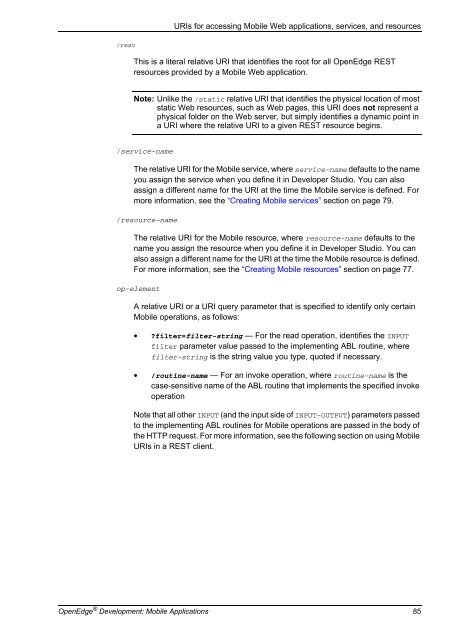OpenEdge Development: Mobile Applications - Product ...
OpenEdge Development: Mobile Applications - Product ...
OpenEdge Development: Mobile Applications - Product ...
You also want an ePaper? Increase the reach of your titles
YUMPU automatically turns print PDFs into web optimized ePapers that Google loves.
est<br />
URIs for accessing <strong>Mobile</strong> Web applications, services, and resources<br />
This is a literal relative URI that identifies the root for all <strong>OpenEdge</strong> REST<br />
resources provided by a <strong>Mobile</strong> Web application.<br />
Note: Unlike the /static relative URI that identifies the physical location of most<br />
static Web resources, such as Web pages, this URI does not represent a<br />
physical folder on the Web server, but simply identifies a dynamic point in<br />
a URI where the relative URI to a given REST resource begins.<br />
/service-name<br />
The relative URI for the <strong>Mobile</strong> service, where service-name defaults to the name<br />
you assign the service when you define it in Developer Studio. You can also<br />
assign a different name for the URI at the time the <strong>Mobile</strong> service is defined. For<br />
more information, see the “Creating <strong>Mobile</strong> services” section on page 79.<br />
/resource-name<br />
The relative URI for the <strong>Mobile</strong> resource, where resource-name defaults to the<br />
name you assign the resource when you define it in Developer Studio. You can<br />
also assign a different name for the URI at the time the <strong>Mobile</strong> resource is defined.<br />
For more information, see the “Creating <strong>Mobile</strong> resources” section on page 77.<br />
op-element<br />
A relative URI or a URI query parameter that is specified to identify only certain<br />
<strong>Mobile</strong> operations, as follows:<br />
• ?filter=filter-string — For the read operation, identifies the INPUT<br />
filter parameter value passed to the implementing ABL routine, where<br />
filter-string is the string value you type, quoted if necessary.<br />
• /routine-name — For an invoke operation, where routine-name is the<br />
case-sensitive name of the ABL routine that implements the specified invoke<br />
operation<br />
Note that all other INPUT (and the input side of INPUT-OUTPUT) parameters passed<br />
to the implementing ABL routines for <strong>Mobile</strong> operations are passed in the body of<br />
the HTTP request. For more information, see the following section on using <strong>Mobile</strong><br />
URIs in a REST client.<br />
<strong>OpenEdge</strong> ® <strong>Development</strong>: <strong>Mobile</strong> <strong>Applications</strong> 85
















